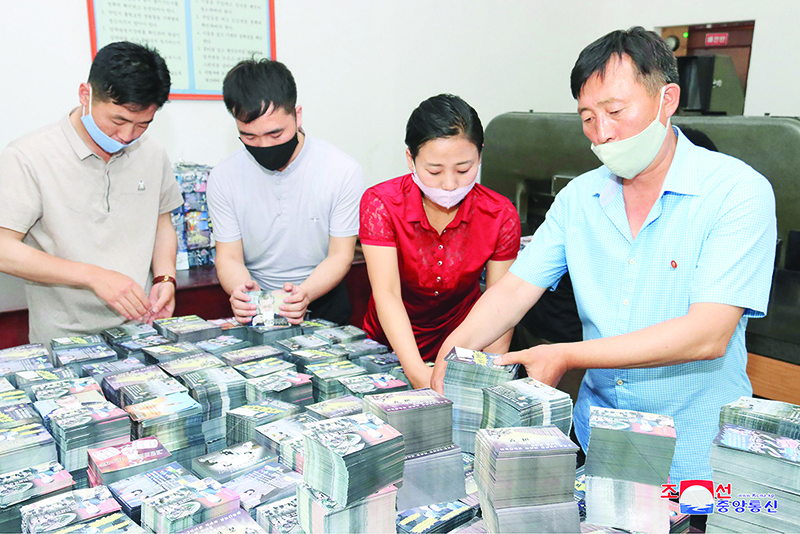
SEOUL: North Korea pledged to push ahead with its campaign to send propaganda leaflets into South Korea, saying it is not bound to any inter-Korean agreements, state media said yesterday.
Tension has been rising after North Korea blew up a joint liaison office and threatened military action over defectors in the South sending anti-North leaflets across the border. As state media reported angry North Koreans gearing up for their own “large-scale” leaflet campaign, Seoul’s Unification Ministry handling cross-border affairs on Saturday urged the plan to be scrapped citing a violation of peace agreements.
The United Front Department of the North’s ruling party, in charge of inter-Korean affairs, rejected the ministry’s calls as an “absurd nonsense.”
“Given their own wrongdoings, how dare they utter such words as regret and violation?” the department’s spokesman said in a statement carried by state media KCNA. “When they are put in our shoes, the South Korean authorities will be able to understand even a bit how disgustedly we looked at them and how offending it was for us.”
The two Koreas, which are still technically at war as their 1950-53 conflict ended without a peace treaty, have waged leaflet campaigns for decades but agreed to cease “all hostile acts” in a 2018 peace accord.
Several defector-led groups have regularly sent back flyers, together with food, $1 bills, mini radios and USB sticks containing South Korean dramas and news, usually by balloon over the border or in bottles in rivers.
One of the groups dropped a plan to float hundreds of plastic bottles stuffed with rice, medicine and face masks into the sea near the border yesterday. Pyongyang has also used balloons and drones to fly its anti-South leaflets, which in South Korea in the past have been rewarded with stationery if reported to police.
Heightened tensions
North Korea has upped the pressure over the campaigns with a dramatic demolition of a building on its side of the border that symbolized inter-Korean rapprochement, threats to bolster its military presence at the border, and now leaflets of its own. “Enraged” North Koreans are now “pushing forward with the preparations for launching a large-scale distribution” of “leaflets of punishment” into the South, the official KCNA news agency said.
“Every action should be met with proper reaction and only when one experiences it oneself, one can feel how offending it is.” Photos carried by the official Rodong Sinmun newspaper showed North Koreans preparing the leaflets, and cigarette butts and ashes scattered over flyers featuring the face of South Korean President Moon Jae-in.
Moon, who has long favored engagement with the North, was targeted earlier this week by Kim Yo Jong—the powerful sister of North Korean leader Kim Jong Un—in an extensive diatribe, calling him “disgusting” and “impudent”. Seoul retorted with unusually stern criticism to Pyongyang’s latest denunciations of Moon and its blowing up of the liaison office this week, saying it will “no longer tolerate” the North’s “unreasonable acts and words”.
Inter-Korean relations have been in deep freeze for months, following the collapse of a summit in Hanoi between Kim Jong Un and US President Donald Trump. That meeting foundered on what the nuclear-armed North would be willing to give up in exchange for a loosening of sanctions.
Saturday’s KCNA report on the leaflets comes a day after Kim Yeon-chul, South Korea’s point man for relations with the North, resigned over the heightened tensions, expressing hope that his departure “will be a chance to pause for a bit”.
The two Koreas remain technically at war after hostilities in the Korean War ended with an armistice in 1953 but not a peace treaty.
The two Koreas, which are still technically at war as their 1950-53 conflict ended without a peace treaty, have waged leaflet campaigns for decades. South Korea’s military used to launch anti-North flyers across the demilitarized zone, but the program ended in 2010.
Several defector-led groups have regularly sent back flyers, together with food, $1 bills, mini radios and USB sticks containing South Korean dramas and news, usually by balloon over the border or in bottles by river.
Pyongyang has used balloons to send its anti-South leaflets. South Koreans previously were rewarded with stationery if they reported leaflets from the North. — Agencies









